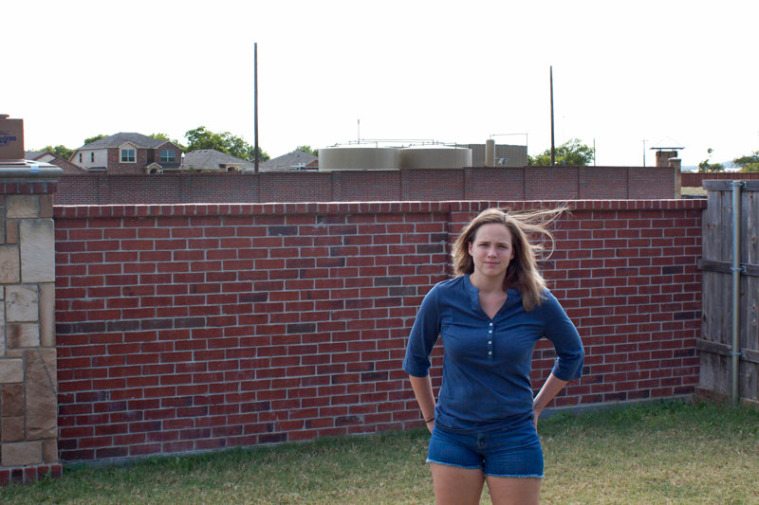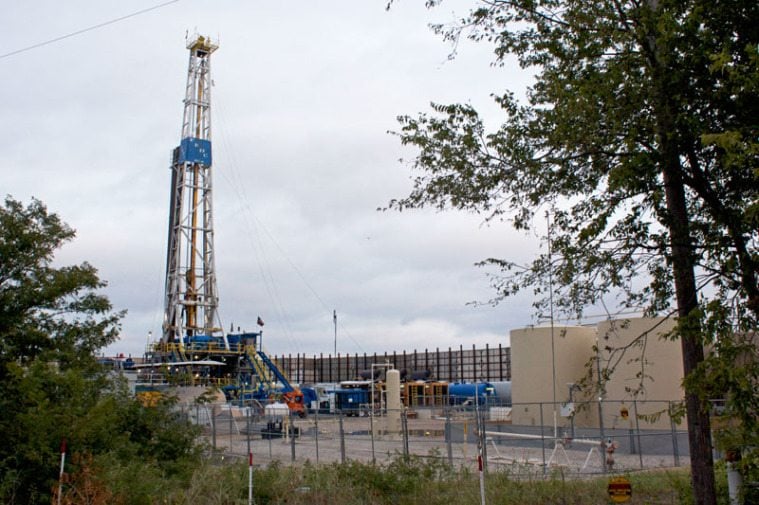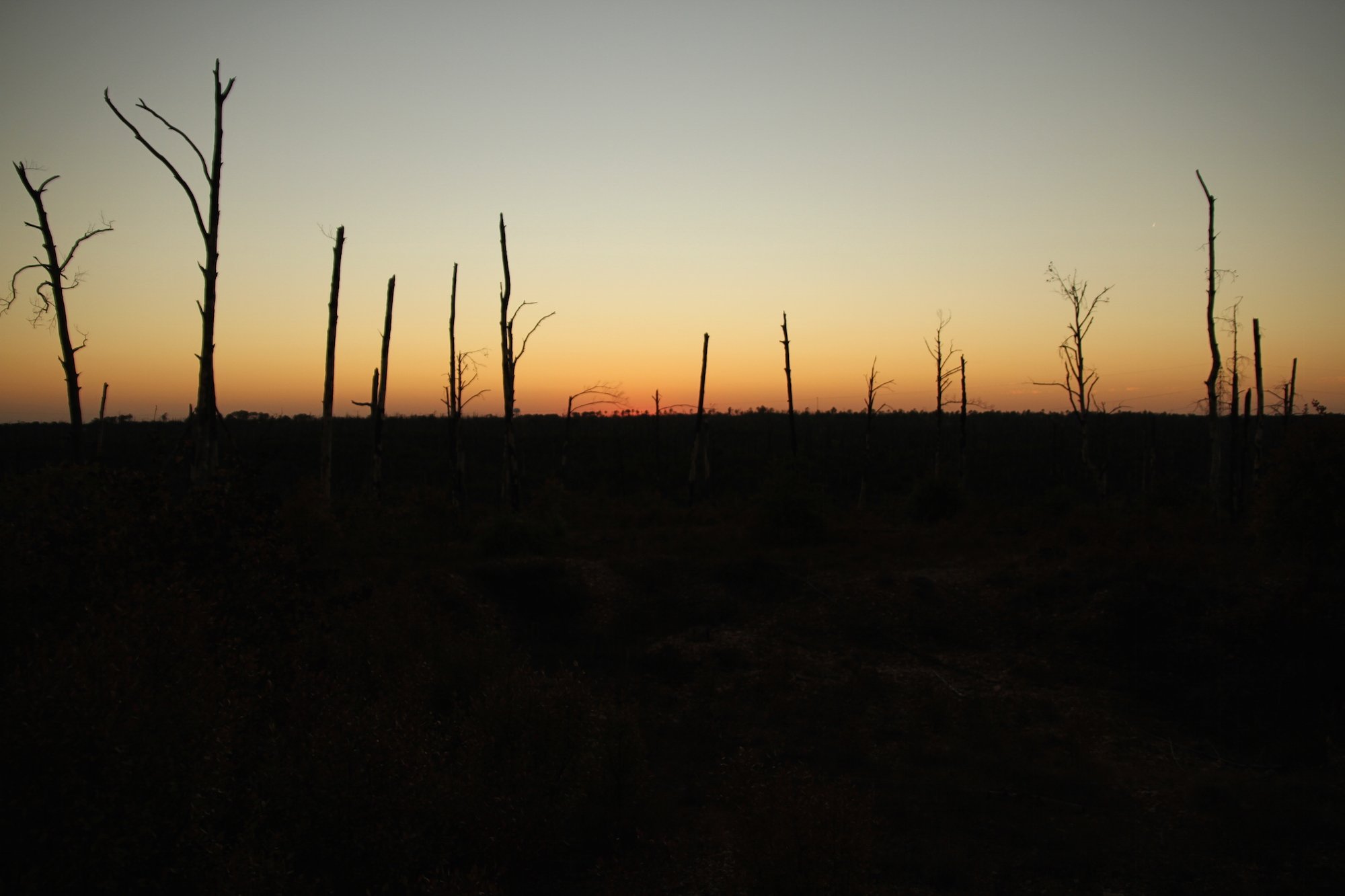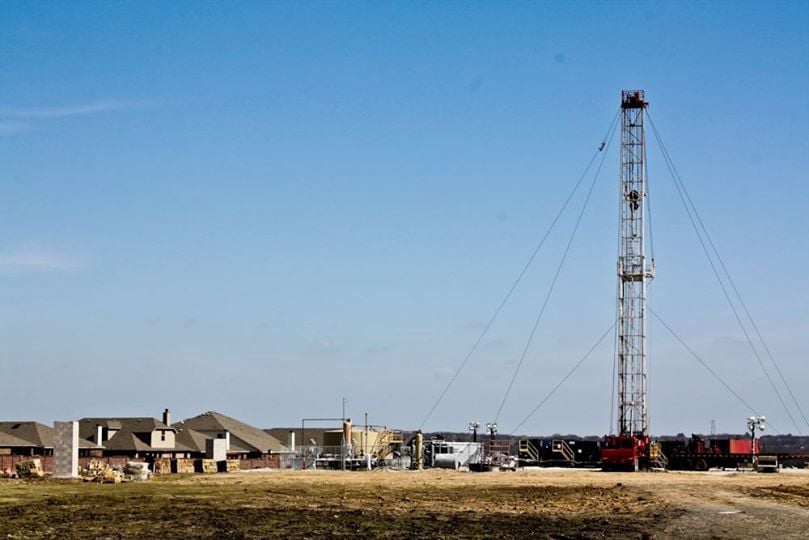
On the Fracking Ban-Wagon in Denton
The North Texas town will soon decide whether to become the first city in Texas to ban fracking.

Above: Supporters of "Frack Free Denton" marching in the city's fourth of July parade.
One day in August 2013, Alyse Ogletree was turning onto her street in a new, unfinished development in Denton when she saw them. Across from her new home: tall, bulky walls that looked like tan sheets attached to rusting metal poles. She had no idea what to make of them. What were they hiding? Weeks later, she got her answer. Eagle Ridge Energy left a notice on her door explaining that the fracking company would be drilling a natural gas well across the street. The walls, the notice explained, were meant to reduce the noise. Alyse and her husband Lance, both in their 20s, had just bought their spacious brick home two years before, never expecting to discover their savings had gone into a house that would eventually have an industrial nightmare for a neighbor.
When the Ogletrees were house-hunting, they’d wondered about the large tanks across the street but a representative with D.R. Horton, the developer, assured the couple that they just held water. More homes, he said, would be be built around them. That was true. But the rep didn’t mention that the water would be used to frack wells less than 200 feet from their home. Once the drilling started, the barrier walls and towering drilling rig practically stared them down through their living room window.
The city currently has a moratorium on drilling new wells while it reviews its existing rules. But many residents are simply fed up.
One day, the house shook so violently that cans tumbled from the shelves in the pantry. Soon, the family noticed cracks in the foundation and found a chunk of concrete had split from the slab. Another day, the chandelier in the family room fell from the ceiling. Luckily no one was in the room. Alyse’s 4-year-old son, Kyle, who suffered a meningitis-induced fever and stroke at eight months that caused him to lose two-thirds of his brain function, receives therapy in that room nine times per week. She bristles at the thought of what could have happened had he not been on on the front porch with his nurse.
Families aren’t supposed to live so close to natural gas wells, per Denton’s current gas drilling ordinance, which went into effect last year. But the ordinance has a loophole: It allows developers to build homes near existing gas wells, which can be re-drilled and re-fracked, and near lots platted for drilling. And the company that owns the wells near the Ogletrees’ home, EagleRidge Energy, has insisted that because its permits for those wells predate the ordinance, the new rules don’t apply and it has the right to drill. When EagleRidge started re-drilling and re-fracking wells so close to new homes, the Ogletrees and many of their neighbors sprang into action. The Denton Drilling Awareness Group (formerly the Denton Advisory Group) wanted to share residents’ concerns about gas drilling with city officials, and had already been trying to work with the city and industry for years to set better rules. The idea was to put distance between fracking and people’s homes, businesses, school and places of worship. But to the Ogletrees and many other families, the effort didn’t seem to be working. So earlier this year, they decided to take a more radical tack. Over the summer, the group gathered enough signatures to get a proposition on the ballot that would ban fracking within city limits.

“To the citizens’ credit, they wanted to try every single avenue available to them to regulate it, to work with the industry, to work with the city—they did everything they could and at every single turn they were thwarted,” says Sharon Wilson, an environmental activist who started organizing in Denton years ago and now works for Earthworks, a Washington, D.C.-based nonprofit.
If the ordinance passes on Nov. 4, Denton will be the first city in Texas to ban fracking. In December, Dallas imposed stringent requirements that effectively ended drilling, but Denton’s proposal is more aggressive and significant because it’s located in a much more active part of the Barnett Shale. In oil-and-gas-friendly Texas, which produces one-third of the United States’ natural gas, the citizen-led effort in Denton is poised to have ripple effects beyond the state’s borders. North Texas was the first densely populated area in the country to be heavily fracked, and to many critics, places like Fort Worth and Arlington serve as cautionary tales of what can happen when fracking takes over a city. Concerned citizens and governments in states where shale plays are exploding are keeping a close eye on Denton.
The fossil fuel industry and some lawmakers characterize the ban as extreme, while activists say they wouldn’t have gone as far as to propose a ban if the city had set better rules—and if the fracking companies followed existing ones. At least one energy company CEO and many pro-ban activists have said that if EagleRidge hadn’t been so brazen and insisted on fracking wells so close to homes, it wouldn’t have come to this.
As the election draws near, tension is building. The campaign around the fracking ban proposition has already become the most expensive in Denton history, according to the Denton Record-Chronicle. Yard signs line neighborhood streets and main avenues, and oil and gas industry-funded billboards urge residents to take a stand “for responsible drilling” by voting against the ban. The pro-fracking group Denton Taxpayers for a Strong Economy had raised $231,000, as of October 7, of which $225,000 came from XTO, EnerVest and Devon—energy companies with natural gas wells in Denton.
Much of that money has gone into colorful mailers claiming that Denton’s “irresponsible drilling ban proposition” will hurt schools and parks because of lost tax revenue. One mailer shows a broken piggy bank with the word “irresponsible” plastered across it, and suggests the city will spend millions in legal costs defending the ban. The group has also taken out full-page color ads in the local paper.
Donate now to support independent, nonprofit journalism.It’s clear that the industry is worried about the possible ramifications, both in Denton and outside of Texas if other cities follow suit. XTO, a subsidiary of ExxonMobil, has only one producing well in Denton’s city limits, yet it donated $75,000 to the pro-drilling group. A spokesperson declined to comment on the potential consequences of the ban on ExxonMobil’s operations in Texas and elsewhere. Devon and EnerVest did not return requests for comment.
On the other side, Pass the Ban has raised $51,000, most of which has gone into yard signs, flyers, door hangers and hosting events. According to the Denton Record-Chronicle, some $30,000 came in the form of in-kind contributions from the national environmental nonprofit Earthworks. An Earthworks spokesman told the newspaper that its Denton fracking ban campaign received about $60,000, more than 95 percent of which was donated by Denton residents.

The pro-drilling Denton Taxpayers group has far outraised its competition, but Pass the Ban has more people on the ground. The Denton Drilling Awareness Group says it has close to 100 volunteers distributing yard signs and flyers, phone banking and registering voters. When they were trying to get the measure on the ballot earlier this year, volunteers needed to collect 596 signatures from registered voters—or one-quarter of the number of people who voted in the last local election—but they gathered nearly 2,000 one month before the deadline. Denton Taxpayers then started circulating a counter-petition and said it gathered 8,000 signatures, but it didn’t require signers to be registered voters. The pro-drilling petition drive was run by a Colorado-based company that paid by the signature and covered canvassers’ travel expenses. Many people apparently believed they were signing the fracking ban petition, and last week angry residents discovered that Denton Taxpayers ran an ad in the newspaper with their names, in many cases without people’s permission—one man told the local newspaper that he twice explicitly denied permission to print his name. Denton Taxpayers for a Strong Economy did not return calls for comment.
The pro-ban group has found many supporters in the relatively liberal college town, but it has also received at least two death threats. In July, the chairman of the Texas Railroad Commission—the agency charged with regulating oil and gas in the state—accused the Denton Drilling Awareness Group of being controlled by Russia.
Tara Linn Hunter, Pass the Ban’s volunteer coordinator, says support spans the political spectrum. “I’ve been really happily surprised with how nonpartisan this issue has been,” Hunter says. “I think a lot of people, even if they support the oil and gas industry, realize that they don’t want it 200 feet from homes. They don’t want it in parks or neighborhoods.”
Support for the ban stems from the failure to negotiate a compromise among citizens, the city and the industry.
“To the citizens’ credit, they wanted to try every single avenue available to them to regulate it, to work with the industry, to work with the city—they did everything they could and at every single turn they were thwarted.”
That amendment enabled EagleRidge to frack a well less than 200 feet from the Ogletrees’ home—residents say the city doesn’t necessarily enforce the setbacks—as well as another well less than 800 feet from their house in a different direction. Residents complained that the wells were too close to their homes. The city reviewed its drilling ordinance, increasing the minimum setback to 1,200 feet. EagleRidge insisted that its land leases for drilling predate the ordinance, and it therefore has “vested rights” that allow it to drill. Before passing the new ordinance last year, the city also negotiated a deal with EagleRidge: The company would not drill any new wells within city limits so long as it could drill the 12 wells it was currently developing, including the two near the Ogletrees’ home. City spokesperson Lindsey Baker says EagleRidge is the only company to claim vested rights and challenge the ordinance.
Residents realized that increasing setback requirements wouldn’t be enough and started collecting signatures to force the City Council to vote on the fracking ban. The City Council chose to kick the issue to voters. Since then, there’s been impressive turnout at pro-fracking-ban events in Denton. At a forum held by the League of Women Voters on a chilly Saturday night in mid-October, residents packed a local pub while the three-person panel fielded questions from the audience.
Tom Giovanetti, president of the conservative think tank Institute for Policy Innovation, assured listeners that the city of Denton will be faced with an onslaught of lawsuits if voters pass the ban. He also said the economic “benefits are worth learning how to manage some of these other problems,” such as “almost immeasurable tremors” and possible water contamination. Ed Soph, a jazz professor at the University of North Texas who represented the Denton Drilling Awareness Group on the panel, responded by saying, “The only risk management we have available now is to pass the ban.”
State Rep. Phil King, R-Weatherford, says the citizen-led initiative to ban drilling is a “tremendous overreaction.” He says the Legislature will likely pass a bill prohibiting cities from banning fracking, and that he might even file that legislation.
“Cities need to have some reasonable regulatory authority—setbacks, that type of thing—but you can’t have every city being able to totally regulate or prohibit or do different levels of prohibition of oil and gas production across the state because it frankly would just create legal chaos,” he told the Observer.
The ban’s supporters believe that’s an empty threat, but the city is preparing for legal challenges. Denton Mayor Chris Watts and Councilmember Kevin Roden say that if the ban passes, it will be the City Council’s duty to fight for citizens’ wishes and uphold the ban.
The city currently has a moratorium on drilling new wells while it reviews its existing rules. But many residents are simply fed up.
“We realized that we would never get an ordinance that could handle this,” Wilson says. Other cities that can put enforceable limits on fracking should do so, rather than ban it, she said, but Denton has no choice. “The only thing we can do is to ban it.”
To support journalism like this, donate to the Texas Observer.
